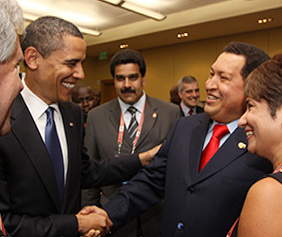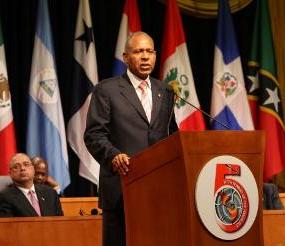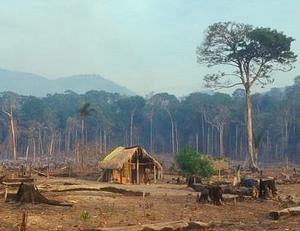Summit of Americas Leaders Pledge Environmental Cooperation
PORT OF SPAIN, Trinidad, April 20, 2009 (ENS) - Government leaders of countries across the Americas reached new spirit of friendliness and cooperation at the Summit of the Americas that concluded here Sunday.
Symbolized by the friendly handshake between U.S. President Barack Obama and Venezuelan President Hugo Chavez that smoothed a prickly relationship between the two countries, the leaders signed a declaration that includes many environmentally-friendly provisions.
 |
U.S. President Barack Obama, left and Venezuelan President Hugo Chavez greet one another at the 5th Summit of the Americas. (Photo courtesy Summit of the Americas) |
President Obama said at the concluding news conference Sunday, "Our energy challenge offers us a chance to unleash our joint economic potential, enhance our security and protect our planet."
Obama proposed a new Energy-Climate Partnership of the Americas. "This is a voluntary and flexible partnership that nations across this region are invited to join; a partnership that will enhance energy efficiency, improve our infrastructure, and support investments that can make energy more affordable," the President said. "In doing so, we can create the jobs of the future, promote renewable sources of energy, and make the Americas a model for cooperation."
"Through this partnership," he told reporters, "we will harness the progress being made by nations across the hemisphere - from Brazil's work on biofuels, to Chile's investments in solar power, to Mexico's efforts to curb greenhouse gas emissions, to El Salvador's work on geothermal energy."
Affirming their "renewed spirit of cooperation, integration and solidarity," the hemisphere's leaders concluded the Fifth Summit of the Americas with a consensus to advance joint solutions to address the most pressing challenges facing the region, including environmental and energy issues.
Entitled, "Securing Our Citizens' Future by Promoting Human Prosperity, Energy Security and Environmental Sustainability," the Declaration of Commitment of Port of Spain was negotiated over the last six months by 34 countries.
Patrick Manning, Prime Minister of the Republic of Trinidad and Tobago, who chaired the summit, said Sunday, "While there were reservations by some countries on particular aspects of the Declaration, the leaders wanted to send a strong signal of solidarity and cooperation."
"The collective view was that the Fifth Summit was a tremendous success, pervaded by a unique spirit of openness and goodwill, and that it heralds the beginning of a new era in inter-American relations," Manning said.
 |
Patrick Manning, Prime Minister of the Republic of Trinidad and Tobago, closes the 5th Summit of the Americas (Photo courtesy Summit of the Americas) |
In the declaration, the leaders agree "to promote adequate and sustainable access to energy, food and water; and to manage our environment responsibly."
They agreed to "foster energy efficiency and conservation in the public and private sectors," in transport systems, industrial sectors, large and small enterprises and at the household level, and agreed to promote cleaner, more sustainable patterns of production and consumption.
The leaders agreed to cultivate investment and innovation in the development and diversification of energy sources and of efficient and environmentally friendly technologies, including cleaner technologies for the production of fossil fuels, and pledged "transparency in energy–related government and private sector activities."
On the controversial issue of biofuels, the leaders pledged "the sustainable development, production, and use of both current and nextgeneration biofuels, with awareness of their social, economic and environmental impact. In accordance with our national priorities, we will work together to facilitate their use, through international cooperation and the sharing of experiences on biofuel technologies and policies."
Bolivia said that "the development of cooperative policies and arrangements intended to expand biofuels in the Western Hemisphere can adversely affect and impact on the availability of foods and raise food prices, increase deforestation, displace populations due to the demand for land, and ultimately aggravate the food crisis," affecting low-income persons, especially the poorest economies of the developing countries.
 |
Parts of the Bolivian Amazon are being deforested for agriculture. (Photo courtesy Boliva Bella) |
While the Bolivian Government said it recognizes "the need to seek and use alternative, environmentally friendly sources of energy, such as geothermal, solar, wind energy and small and medium-sized hydroelectric plants, it proposes an alternative vision based on living well and in harmony with nature, developing public policies aimed to promote safe, alternative energies that guarantee the preservation of the planet, our 'Mother Earth.'"
The leaders agreed that nuclear energy production in their countries will be in strict compliance with obligations under the Treaty on the Non-Proliferation of Nuclear Weapons, and other international agreements on non-proliferation, nuclear safety and nuclear security.
They agreed to develop public education campaigns in each nation, with commitments from governments and industry, to provide the people of the Americas with access to accurate, reliable and impartial information on energy, environmental and climate change issues.
Voluntary corporate social responsibility best practices will be encouraged in the energy sector, "with particular emphasis on initiatives that enhance dialogue among government, industry, local communities, indigenous groups and nongovernmental organisations..."
On the urgent issue of climate change, the leaders declared their recognition of "the adverse impacts of climate change on all countries of the Hemisphere, in particular, Small Island Developing States, countries with low-lying coastal, arid and semi-arid areas or areas liable to floods, drought and desertification, developing countries with fragile mountainous ecosystems and land locked countries."
The leaders committed to work towards "an agreed outcome" at the UN climate change convention in Copenhagen in December, recognizing that "deep cuts in greenhouse gas emissions will be required" to stabilize greenhouse gas concentrations in the atmosphere "at a level that would prevent dangerous anthropogenic interference with the climate system."
They renewed support for the work of the UN's Intergovernmental Panel on Climate Change, "whose findings provide valuable information on climate change mitigation and adaptation."
They promised the conservation of marine resources and the protection of marine ecosystems, including estuaries and coastal areas, particularly in the wider Caribbean, "a marine area of unique biodiversity and highly fragile ecosystems."
The leaders declared their intent to collaborate on the sustainable management of forests and reduced deforestation. They pledged support for:
- sustainable management of protected areas and World Heritage Sites
- protecting endangered and migratory species
- combating illegal international trafficking of biodiversity
- promoting the exchange of scientific knowledge on biodiversity, such as through the Inter-American Biodiversity Information Network
- recognising and sharing the benefits arising from access to and use of genetic resources and associated traditional knowledge.
They agreed to work towards the "successful conclusion of negotiations" on the American Declaration on the Rights of Indigenous Peoples.
Copyright Environment News Service (ENS) 2009. All rights reserved.
To subscribe or visit go to: http://www.ens-newswire.com